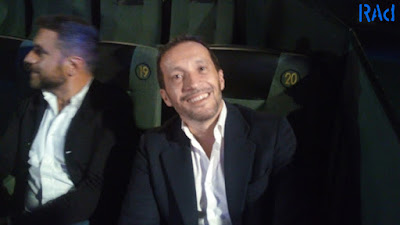 |
| Director Salvador Calvo being interviewed |
The smashing box office success of Heneral Luna back in 2015 has heightened the interest not just for historical films but for Philippine history as well. With the film’s sequel Goyo: Ang Batang Heneral, still in works, the 16th edition of PELÍCULA-PELIKULA, Spanish Film Festival, offered the next best thing for historical film buffs: 1898. Los últimos de Filipinas/1898, Our Last Men in the Philippines.
Depicting the plight of Spanish soldiers
held under siege inside a church in Baler, Aurora during the final days of the
Philippine-Spanish War, the movie made its Philippine premiere was the opening
film of the festival with the director himself, Salvador Calvo, in attendance.
The screening of the film during
opening night was preceded by cocktail reception held at the Ayala Museum with actor
John Arcilla (Heneral Luna) and director Mark Meily (Baler) among the
distinguished guests. A brief chat with Arcilla over some drinks led me to
discover that he once played on stage the role of Martín Cerezo, the Spanish
Lieutenant who is among the main characters in the film.
1898. Los últimos de Filipinas/1898, Our Last Men in the Philippines
Narrating a pivotal moment in the
shared history of the Philippines and Spain but from a Spanish perspective, 1898. Los últimos de Filipinas (2016) starts beautifully with aerial shots of the newest Spanish detachment
wading chest deep through a river. Stunning the visuals may be,
but the film was shot in Equatorial Guinea as having it done on location in the Philippines
would’ve been too far and costly. The sweeping landscape at the start would
quickly give way to the small village and the claustrophobic confines of the
church once the siege starts.
Serving as the audience’s eyes is
the young soldier Carlos (Álvaro Cervantes), a fictional character created for
the film. An aspiring artist who only enlisted to earn a recommendation letter
for art school once the war is over, Carlos is presented as an unwilling
participant in the war. I felt that his character wasn’t aware of the horrors
of the centuries’ long Spanish rule that has led the locals to revolt in the
first place. Carlos is a direct contrast to Lt. Martín Cerezo (Luis Tosar)
whose stern defense of the church is matched only by his denial that the war
between the Philippines and Spain was already over.
Speaking of the locals, the
villagers’ characters and personalities weren’t fleshed out with the exception
of Teresa (Alexandra Masangkay), the whore who tempted the Spanish soldiers
with her seductive singing. The other women were depicted as whores/temptresses
like Teresa and it made me curious to see if this was how Cerezo saw the
Filipinos in his memoirs El Sitio de Baler which Calvo said was one of the
source material for the film.
This film is another piece of the
puzzle in the bigger picture which is Philippine history. The viewer then has
to figure out what was real and what was fiction or changed for dramatic
effect. Interesting to note also is how history is skewed in favor of the film
maker’s country of origin. And as someone who came from the other side, how I
tried to nitpick and look for inaccuracies in the film.
But for whatever this film is
worth, this screening is very timely as the Philippines is steeped in too much
political intrigue of late and looking back at history is essential to make
sure that the country moves forward towards the right direction. It made me want to brush up on my Philippine history like what the film Heneral Luna did for a lot of people. It also made me want to get an English translation of Cerezo's memoirs if it's available.
PELÍCULA-PELIKULA, Spanish Film Festival was presented by Instituto Cervantes, Manila.
PELÍCULA-PELIKULA, Spanish Film Festival was presented by Instituto Cervantes, Manila.



No comments:
Post a Comment